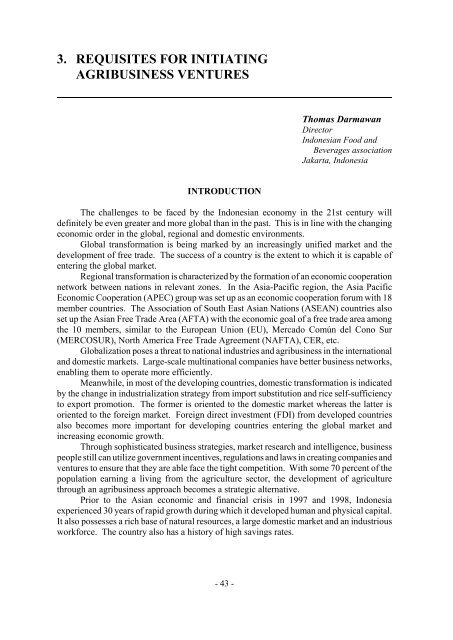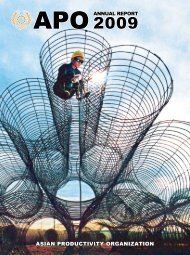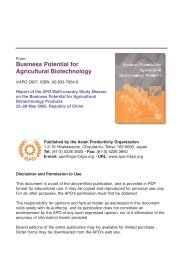Development of Agribusiness Enterprises - Asian Productivity ...
Development of Agribusiness Enterprises - Asian Productivity ...
Development of Agribusiness Enterprises - Asian Productivity ...
You also want an ePaper? Increase the reach of your titles
YUMPU automatically turns print PDFs into web optimized ePapers that Google loves.
3. REQUISITES FOR INITIATING<br />
AGRIBUSINESS VENTURES<br />
INTRODUCTION<br />
- 43 -<br />
Thomas Darmawan<br />
Director<br />
Indonesian Food and<br />
Beverages association<br />
Jakarta, Indonesia<br />
The challenges to be faced by the Indonesian economy in the 21st century will<br />
definitely be even greater and more global than in the past. This is in line with the changing<br />
economic order in the global, regional and domestic environments.<br />
Global transformation is being marked by an increasingly unified market and the<br />
development <strong>of</strong> free trade. The success <strong>of</strong> a country is the extent to which it is capable <strong>of</strong><br />
entering the global market.<br />
Regional transformation is characterized by the formation <strong>of</strong> an economic cooperation<br />
network between nations in relevant zones. In the Asia-Pacific region, the Asia Pacific<br />
Economic Cooperation (APEC) group was set up as an economic cooperation forum with 18<br />
member countries. The Association <strong>of</strong> South East <strong>Asian</strong> Nations (ASEAN) countries also<br />
set up the <strong>Asian</strong> Free Trade Area (AFTA) with the economic goal <strong>of</strong> a free trade area among<br />
the 10 members, similar to the European Union (EU), Mercado Común del Cono Sur<br />
(MERCOSUR), North America Free Trade Agreement (NAFTA), CER, etc.<br />
Globalization poses a threat to national industries and agribusiness in the international<br />
and domestic markets. Large-scale multinational companies have better business networks,<br />
enabling them to operate more efficiently.<br />
Meanwhile, in most <strong>of</strong> the developing countries, domestic transformation is indicated<br />
by the change in industrialization strategy from import substitution and rice self-sufficiency<br />
to export promotion. The former is oriented to the domestic market whereas the latter is<br />
oriented to the foreign market. Foreign direct investment (FDI) from developed countries<br />
also becomes more important for developing countries entering the global market and<br />
increasing economic growth.<br />
Through sophisticated business strategies, market research and intelligence, business<br />
people still can utilize government incentives, regulations and laws in creating companies and<br />
ventures to ensure that they are able face the tight competition. With some 70 percent <strong>of</strong> the<br />
population earning a living from the agriculture sector, the development <strong>of</strong> agriculture<br />
through an agribusiness approach becomes a strategic alternative.<br />
Prior to the <strong>Asian</strong> economic and financial crisis in 1997 and 1998, Indonesia<br />
experienced 30 years <strong>of</strong> rapid growth during which it developed human and physical capital.<br />
It also possesses a rich base <strong>of</strong> natural resources, a large domestic market and an industrious<br />
workforce. The country also has a history <strong>of</strong> high savings rates.
















